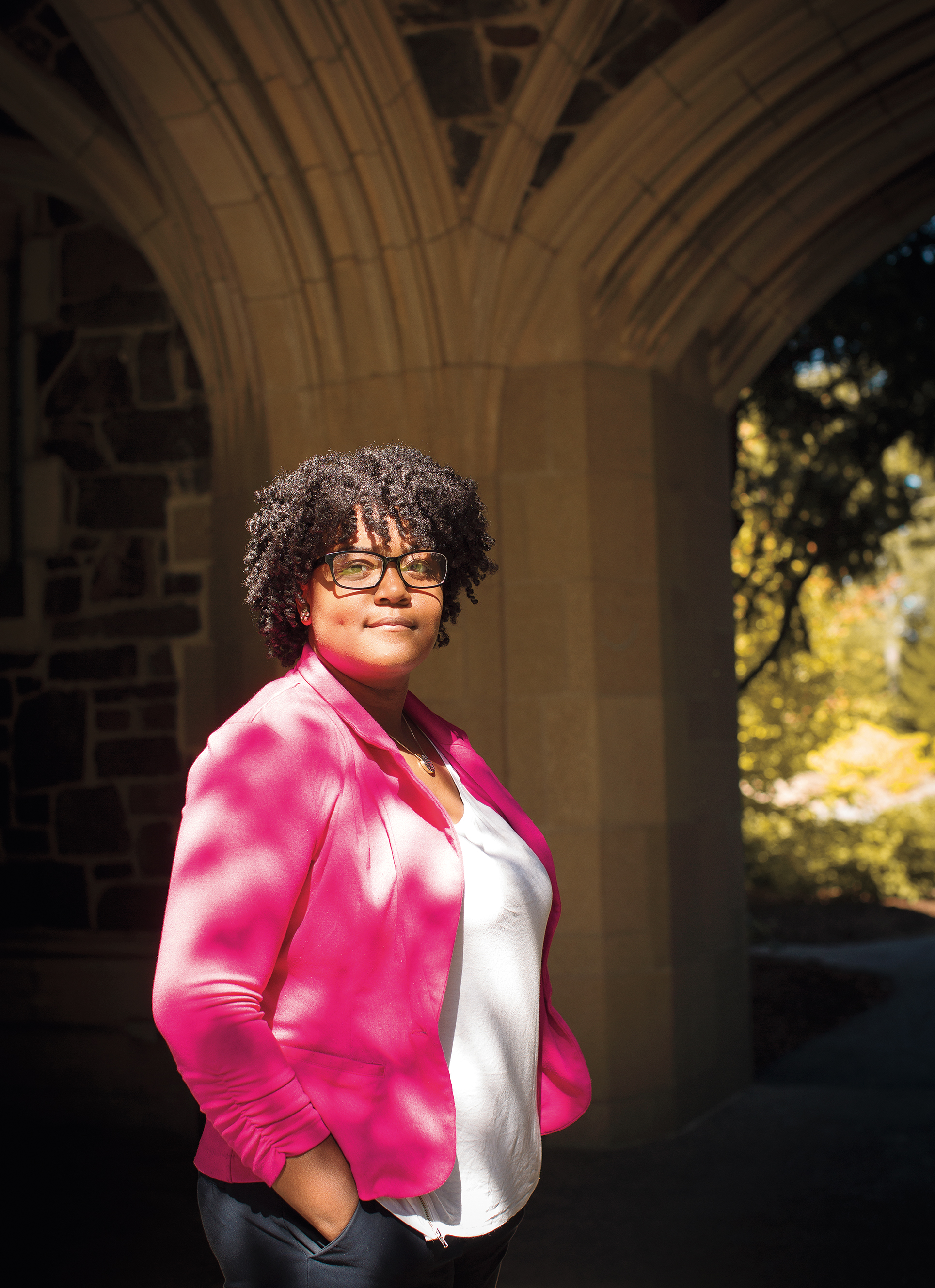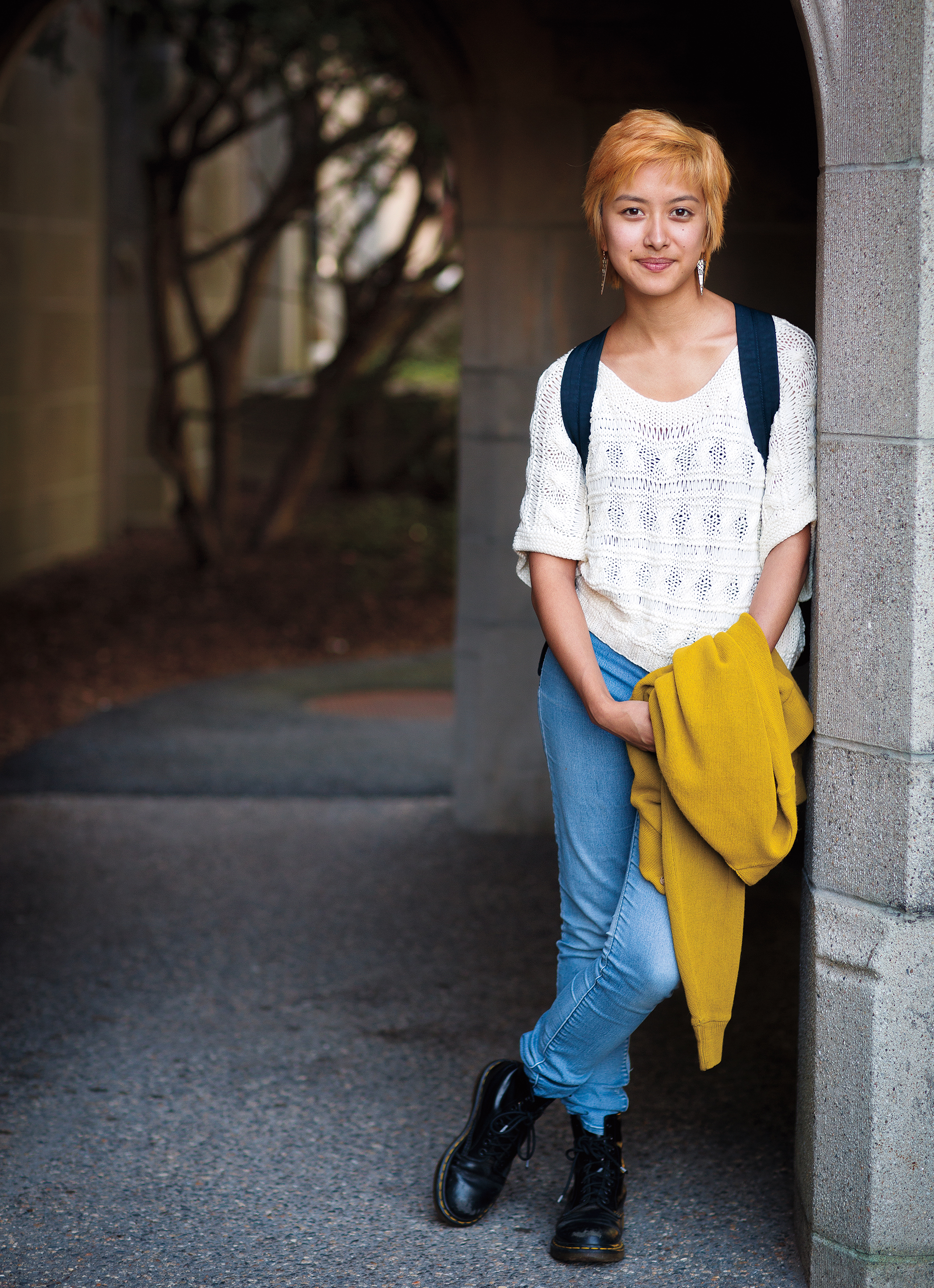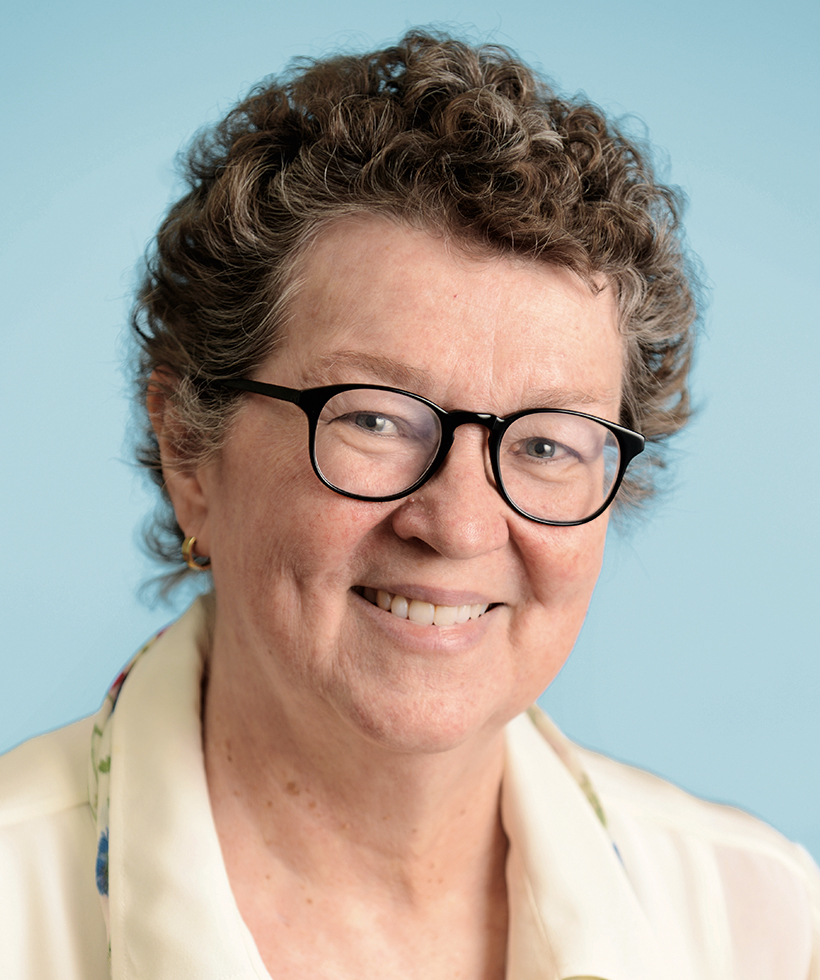It’s move-in day at Wellesley. Overloaded cars pull up to dorms, parents and students drag plastic tubs and rolling suitcases, armloads of clothing, bedding, and pillows into rooms often too small to accommodate all that stuff. Parents greet other parents, reunited students shriek and hug. Families troop to the Lulu bookstore or the Vil to pick up a bit more stuff for their daughters’ rooms. Posters are hung; computers are connected to the network; suitcases and boxes are emptied. Then there are the good-byes, some tearful, some not. And the students’ year begins.
Everyone knows this time-honored ritual, right? Not necessarily. Take Joy St. John’s first day at college. “I remember my dad dropping me off,” says St. John, Wellesley’s dean of admission and financial aid. The first member of her immediate family to go to college, she enrolled at Stanford, which might as well have been “going to Mars,” she says. Freshman year, her dad dropped her off at the Palo Alto, Calif., campus.
“We drove down from Oregon in one day, and we unloaded everything,” she recalls. “He handed me my laundry basket, and said, ‘OK, I’ll see you.’ And he turned around and got in the car and drove right back up to Oregon. Other people’s parents are hanging out with them, and there I am, alone with my laundry basket.”
St. John went on to a successful college experience, though it was not without challenges. “The first day of Western Civ, when we went through the syllabus, half of the kids had read half the books already. And I’m thinking, I haven’t read any of these books yet,” she recalls.
Today, she enjoys her leadership role in identifying and bringing other first-generation students to Wellesley.
“What we’re recognizing is that everyone benefits from being part of a diverse community and experiencing a diverse set of perspectives,” St. John says. “In the ’80s and ’90s, we had some really important conversations about the importance of diversity from a racial and ethnic perspective. It’s only in the past 15 years that we’ve been—as a community of selective colleges—talking more about the importance of socioeconomic diversity.”
St. John feels that students whose families are new to the college experience broaden the educational conversation. “What if you’re in a political-science class and you’re having a conversation about welfare reform?” she says. “If no one’s ever been on welfare, it’s a different conversation than if a few students in the classroom have received public assistance. It’s important to realize that you’re not talking about ‘other people.’ You’re talking about the person sitting next to you. You’re realizing that these people share your intellectual gifts and talents. They’re just as smart as you. They’re just as ambitious as you.”

‘I am a strong person. But I had numerous days when I thought, “This is too much. I want to go home.” … But giving up is the easy way out. If I had given up and gone home, that wouldn’t have solved anything.’
—Serenity Hughes ’18
A Matter of Money
In 2014, 28.6 percent of the 754,545 students who used the Common Application to apply to college nationwide identified as first-generation—defined as coming from a family in which neither parent has a four-year degree. At Wellesley, 12 percent of students are first-generation, based on the same definition.
Many first-generation students also come from low-income families. According to data from the Higher Education Research Institute at UCLA, in 2014, median family income was $37,565 for freshmen whose parents did not attend college and $99,635 for those whose parents did. In the Ivy League, the gap is even more dramatic—the New York Times reported that at Harvard, more than half of the freshman class in 2014 came from families making over $125,000 a year, including 15 percent with incomes between $250,000 and $500,000 and another 14 percent over $500,000. The family income of the 15 percent of freshmen who are first-generation was less than $40,000.
First-generation students face challenges both getting to college and adjusting once they’re there. The College Board reports that high-school students whose parents did not attend college are more likely to delay college entry; they also report lower educational expectations than their peers as early as eighth grade. As a group, these students tend to apply to and attend less selective colleges that are closer to home. And they often begin college less academically prepared than other students.
Wellesley works closely with programs such as QuestBridge, Bright Prospect, MasterCard Foundation Scholars, and a variety of community-based and charter-school programs to identify promising students who may be unfamiliar with the college application process. These candidates may be first-generation, or students who come from low-income families or under-resourced communities.
“All of these students are under-represented in selective colleges and universities around the country,” says St. John. “It’s hard to make the claim that we’re training the future leaders of this country and of the world if we’re disregarding or excluding any one group. If our mission is to provide an excellent liberal-arts education to women who will make a difference in the world, we have an obligation to make sure that we’re developing female leaders who are relevant across various communities, both nationally and internationally. It’s hard to argue that all the leaders are going to come from one neighborhood, or one race or ethnicity.”
WellesleyPlus
Once first-generation students arrive on campus, the College offers a voluntary program called WellesleyPlus to assist with the transition and build on academic strengths. WellesleyPlus groups may include first-generation college students, those from low-income families, and students from under-resourced high schools.
WellesleyPlus students enroll in designated fall first-year seminars that aim to help them learn about and access the array of campus resources that may be unfamiliar. In addition to common coursework, students in WellesleyPlus are part of a first-year mentor group that guides them through the fall semester. They participate in weekly “success seminars” designed to build strong academic skills, and take part in a fall retreat and a winter workshop. At the end of the first year, students can apply for a career-exploration shadowing program for the month of June.
Last year, Ann Velenchik, dean of academic affairs and associate professor of economics, taught one of the WellesleyPlus fall seminars, about women in the American labor market. She says, “First-generation students’ backgrounds are different. There are, therefore, things they need help with that other students don’t need help with. Those things are generally not intellectual. They are navigational; they’re about how to make your way through this experience.”
Velenchik says that her students brought a high level of energy and commitment to the class. “A lot of the conversation about first-generation students, and about high financial need students generally, is about the gift that Wellesley is giving those students in terms of the financial aid and support. I think we need to be focused equally on the enrichment that these students bring to our community. I think there’s a wisdom and a maturity. Our students are extremely cosmopolitan on average; this group is generally less so. But they are way more grown up in terms of understanding where their responsibility lies—that it’s about them.”
Dislocations
Even with support, the Wellesley experience can feel overwhelming. “A lot of the first-generation students the elite New England colleges are recruiting are not New Englanders,” says Velenchik. “It’s a long way to travel. It’s a big cultural dislocation. It’s a big food dislocation. There are a lot of dimensions in which this place is very far away.”
Serenity Hughes ’18 remembers experiencing that sense of dislocation when she moved into Tower Court as a first-year. “It was weird,” she says. “We’re in a suburb here. I’m from Chicago, and Wellesley looks a lot different from the neighborhood I grew up in. I’m still getting used to it, to be honest. It was weird—spooky—but it was amazing at the same time.”
Hughes came to Wellesley from Chicago’s South Side. Neither of her parents graduated from college, but her mother works in education as the office manager for the University of Chicago Charter School.
“I always wanted to go to college,” she says. “It was instilled in me. It was the one thing my mom and dad wanted to be sure that I did; it was a no-brainer.”
The sophomore says there were times in her first year when she wondered if she could stick it out. She’s a bit surprised, she says, that she didn’t give up. “I am a strong person. But I had numerous days when I thought, ‘This is too much. I want to go home.’ The Chicago public schools aren’t great, and though I attended a selective-admission school, I don’t think it adequately prepared me for Wellesley. And I was out of my comfort zone. I was expecting it to be hard, but I wasn’t expecting it to be as hard as it was. But giving up is the easy way out. If I had given up and gone home, that wouldn’t have solved anything.”
Finding a Network
“There’s a sense, I think, that everybody who comes to Wellesley starts at the same place. But it’s actually not true at all; what’s possible for you depends in part on what you think is possible for you. If you don’t know any of that, you need help in ways that other people don’t,” says Donald Leach, associate director of residential life.
In 2013, Leach collaborated with several colleagues to launch the Wellesley First Generation Network. “We’re trying to create structures and relationships that allow first-gen students to see, ‘Oh, that thing that is possible for my roommate, whether it be an internship or my junior year abroad, is possible for me, too.’ We’re trying expand the sense of possibility,” he says.
In March 2015, the network hosted the Third Annual First Generation College Student Summit, welcoming 200 students (including 35 from Wellesley) from 36 colleges and universities. Massachusetts Senator Elizabeth Warren, first generation herself, sent videotaped welcoming remarks.
For Elizabeth Cho ’16, finding her feet at Wellesley involved connecting with the network. She’s now one of its two student coordinators.
“All first years are a bit anxious and scared—and socially awkward, maybe—but I was trying hard to find a community of students who maybe understood my struggle a bit,” she says. Then, in the spring semester of her first year, Cho attended an organizational meeting for the network. “It was so awesome to see so many other first-gen students all in one room,” she recalls. “When we all started talking about our common experiences, that’s when it clicked: This is what first-gen identity is like. It transcends race. It transcends nationality and immigrant status—all those things.”
Cho came to Wellesley from Southern California. “My mom and dad are both immigrants. My mom is from Mexico and my father’s from Korea. Chino, the city I’m from, is very modest,” she says. Early in her high-school career, she was accepted into a college-readiness program, Bright Prospect, a nonprofit that connects lower-income, often minority students to resources like SAT-prep classes.
“Oftentimes, college recruiters don’t visit schools like the high school I went to, but they’ll go to the Bright Prospect office. A lot of the schools that they try to get students interested in are private, liberal-arts schools. And a lot of students who are first-gen, or who don’t know as much about the college process, or whose family doesn’t know about liberal-arts schools—you just don’t know how much financial aid you can get.” (See “Affordability and Access Through Aid,” below.)

‘My parents have always been honest with me about how they wish they could have finished school. Many people assume that low-income families don’t value education, but that couldn’t be further from the truth.’
—Isabel Staccuneddu ’15
The Elephant in the Room
Being first-generation is an invisible attribute, which can make students feel more isolated. To achieve visibility, the First Generation Network gives out bright red “I AM FIRST GEN” T-shirts to faculty, students, and staff and asks them to wear them during Spring Open Campus and on May 1.
Then there’s the matter of money. Karen Shih, assistant dean of intercultural education and advisor to students of Asian descent, was one of the first organizers of the network—and is first-generation herself. She says that first-generation students do manage to find each other, but at the same time can find it hard to develop a sense of belonging within the larger Wellesley community. “The institution’s identity is associated with status and wealth,” Shih says. “That disconnect is really uncomfortable for many of them. And it’s taboo to talk about class, but it’s the great reality.”
“It’s the big elephant in many rooms,” says Leach.
Ann Velenchik says that the topic of living side-by-side with affluence as a daily reality often came up in her class. “One of [my students] described it as the difference between being the people who sell their clothes online on the for-sale bulletin, and being the students who buy other people’s clothes online. One of my students bought a North Face, the long North Face puffer coat, from a girl who had three. She had a black and a gray and a brown. The coat my student bought had never been worn. Why would you have three? She bought it for practically nothing,” she says.
A Sense of Belonging
Cho says she adjusted to the College gradually. Now, “I’m super happy at Wellesley, but in my first year, I struggled, thinking, Wellesley fits me. It fits my needs. It gives me aid. I love the professors. I love the class sizes. I love the campus. But I thought, I don’t fit Wellesley.”
Isabel Staccuneddu ’17, the other student coordinator for the First Generation Network, has also felt that way. Staccuneddu came to Wellesley from East Northport, N.Y. “My dad immigrated to Long Island in 1983 from southern Italy to find construction work,” she says. “He’s self-employed as a handyman now. My mother, a lifelong New Yorker, worked at Home Depot for 20 years, and is now a certified nursing assistant. My father has a middle-school education, and my mother finished high school.”
At Wellesley, she says, she has experienced what psychologists call imposter syndrome—the feeling that one is not really successful, competent, and smart, and may have been admitted by mistake. “As a first-year, I couldn’t believe the large percentage of my classes that were dedicated to group discussion. I didn’t think I had anything to contribute to class conversations. I found it difficult to ask for help, to approach professors, and to navigate academic resources. There had been a steady narrative of ‘You must work so hard,’ ‘Your parents are so proud,’ and ‘First-gen students are an inspiration,’ from my overwhelmingly not-first-gen high school. Going from being the obedient, high-achieving immigrant’s kid who confirms every assumption people have about the United States being a meritocracy, to needing help in all capacities adjusting to college was a huge culture shock.”
Staccuneddu adds, “Colleges like Wellesley were not built with first-generation students in mind. Faculty, staff, and peers assume, more often than not, that people enter Wellesley with a similar set of skills. It seems like they think everyone understands professor-student interactions, no one works beyond some work-study hours, and everyone grew up in an educated household. Learning how to exist in a space designed for the elite while still holding your identity close is a big undertaking that takes a lot of time and support. This is why we need the First Generation Network.”
Family Ties
For any student, adjusting to being away from home has some bumpy moments. For first-generation students, the fact that their families are unfamiliar with what college is like can add to that discomfort.
“There was a time my first year where I was calling my mom constantly, saying, ‘Oh, this is so rough,’” says Cho. Her mother, concerned, finally said, “Honey, if you need to come home, just come home, if it’s too much for you.”
Cho adds, “I think from the side of the parents, it’s so hard, because they don’t know what to tell you. Sometimes they say, ‘Just do your best,’ you know? Or you’ll tell them about your classes, and they’re like, ‘Oh, good job, keep studying.’ But things like advice about going to your professor’s office hours, or advice on going to this networking opportunity? They don’t know about that. But my parents have definitely been super-supportive in every sense that they’ve been able to.”
Staccuneddu says she also has received nothing but enthusiastic support from her parents. “Like any parents, they want me to be happy, and their own experiences have shown them that college is the key to a better life,” she says. “My parents have always been honest with me about how they wish they could have finished school. Many people assume that lower-income families don’t value education, but that couldn’t be further from the truth. My parents love Wellesley. While things like faculty research and grant opportunities are unfamiliar terrain, they can understand that I am happy and healthy here.”
In Ann Velenchik’s course on women in the American labor market, most students came from families in which both parents worked. “One parent staying home is a middle-class luxury good in the U.S.,” says Velenchik. “These students had a really clear sense—a sense that perhaps our other students don’t have—of what it’s like to work for a living in a job that doesn’t give you any intrinsic pleasure. That was a huge focus of the conversation: that to be able to do work that you love and get paid for it puts you in a very elite group on the face of the earth. [Students] from families where work was not always associated with fulfillment [brought] a really interesting perspective to the party.”
It’s a perspective Staccuneddu recognizes. “I appreciate being here immensely after having grown up watching my parents work unconventional hours in physically demanding fields,” she says. “I experienced firsthand that my education is nothing to take for granted.”

‘I think from the side of the parents, it’s so hard, because they don’t know what to tell you. … Things like advice about going to your professor’s office hours, or advice on going to this networking opportunity? They don’t know about that.’
—Elizabeth Cho ’18
After Graduation
Last year, the First Generation Network offered a panel about the transition from college to professional life. Rosa Fernandez ’07 was one of the speakers.
Fernandez and her twin sister came to the U.S. from the Dominican Republic at age 14 and settled with their family in the Bronx.
“I went to a public school in the city for recent immigrant students who spoke no English. In my senior year, I went to my history teacher crying and told her I wasn’t going to college,” she says. “She looked at me and said, ‘Of course you are going to college.’ It was not something that I knew that I could do as an immigrant and a first-generation. I had no knowledge, and neither did my parents, about the application process or even what Wellesley was.”
But Fernandez filled out her applications and was accepted at a list of very competitive colleges, including Smith, Haverford, and Bryn Mawr.
“I had never left the Bronx,” says Fernandez. “But when I arrived at Wellesley, I just knew that I belonged there. It was the culture and how diverse, intelligent, engaging, motivated, and interested in the world the students were.”
When Fernandez toured campus, she saw banners that read, “Women who will make a difference in the world.”
“It sounds clichéd but it spoke to me because of my own history and how women had been so impactful in my life. The fact that it was displayed around campus helped me decide to come to Wellesley,” she says.
After graduation, Fernandez worked for the New York City Department of Education. “I wanted other kids like me from all backgrounds to have the same opportunity that I had to achieve all the things that I have,” she says.
She worked in a challenging and politically charged job that involved identifying under-performing high schools. Having received an M.A. from Columbia, she wanted to work on improving the transition from high school into college. She is now employed by the College Board, testing interventions and programs to help low-income, high-performing students apply to college and navigate the financial aid process—“All the things I know from experience,” she says.
“I recall so many of my college friends knowing how to go to professors’ office hours. That sounds so simple, but it isn’t—not for all students, especially if you come from public, under-resourced schools. It’s not the culture. But learning to ask questions and get help—those are skills that will serve you well for the rest of your life. It’s a learning curve that you have to do right away. Don’t give up!”
Serenity Hughes has no intention of giving up. “I don’t want to say first-gens are more eager than other people—but we don’t really have anything to fall back on,” she says. “And I don’t have parents who have hundreds of thousands or millions of dollars to support me. The only thing I can do is stay here and do my best. I am hungry for success. And it’s all on me.”
Affordability and Access Through Aid
When Elizabeth Cho ’16 was in high school and met with college recruiters, she recalls, “They were trying to get us interested in private liberal-arts colleges specifically, because those colleges give so much financial aid.” The information was eye opening, she says. “A lot of students who are first-gen just don’t know how much you can get. There’s a huge misconception. You think, ‘Oh, I’m going to go to UC Berkeley instead of Stanford, because Stanford is so expensive,’ But schools like Stanford give so much, you might get 100 percent of your need met.”
In 2014–15, Wellesley awarded more than $59 million in financial aid, and the average annual award was more than $42,000. Joy St. John, dean of admission and financial aid, says that for qualified students, “Places like Wellesley minimize or eliminate student loans and student debt, and students have access to everything on campus with either no fee or a very minimal fee.”
Not all first-generation students come from low-income families, but many do. While Wellesley admission remains need blind, beginning in 2008 the College replaced all loans with grants in financial-aid packages for low-income families—meaning those students graduate with as little debt as possible. And the College is deeply committed to socioeconomic diversity. (In September 2015, Wellesley came in at number 20 among 179 institutions in the New York Times annual College Access Index, which measures efforts on achieving economic diversity.)
To make the potential financial advantage of enrolling at Wellesley more tangible, economics professor Phil Levine, working with College admissions and technology partners, developed an online estimator tool called My inTuition. The college-cost estimator allows users to calculate how much aid their family might qualify for. (You can try My inTuition here.)
“My inTuition is particularly helpful for students from families with modest financial means, because the greatest barrier can be the assumption that the sticker price—the cost of attendance—is what everyone pays,” says St. John. “I’ve been at college fairs where I met with parents and showed them the tool. They call their child over and say, ‘We’re going to look at this school.’”

Catherine O’Neill Grace’s father didn’t graduate from college—and one of his proudest moments as her dad was the day she received her Middlebury College degree. Grace is a senior associate editor of this magazine.











We ask that those who engage in Wellesley magazine's online community act with honesty, integrity, and respect. (Remember the honor code, alums?) We reserve the right to remove comments by impersonators or comments that are not civil and relevant to the subject at hand. By posting here, you are permitting Wellesley magazine to edit and republish your comment in all media. Please remember that all posts are public.